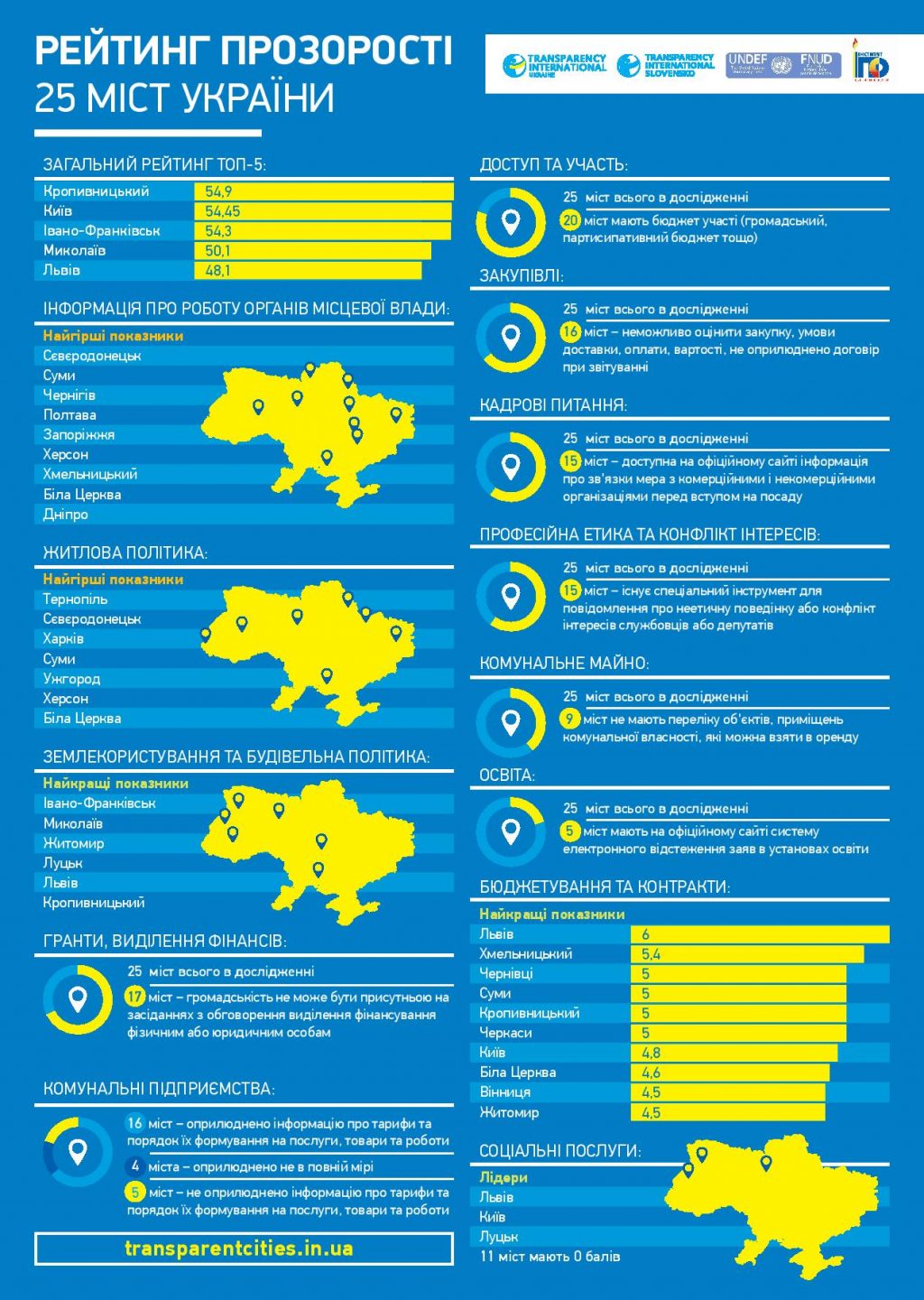The first five in the ranking of transparent municipalities are Kropyvnytskyi, Kyiv, Ivano-Frankivsk, Lviv and Mykolaiv. These were the results of a research presented at Ukraine Crisis Media Center.
Cities were researched by 91 indicators characterizing 13 sectors and branches: work of local government, accessibility and participation, procurement, data on housing policy, budgeting and contracts, grants, allocation of finances, social services, staffing, professional ethics and conflict of interests, information on land use and construction policies, utilities and property, and education. The research is a pilot analysis of cities’ transparency and openness conducted by Transparency International Ukraine and the Institute of Political Education. The basis was the Slovak methodology adapted to Ukrainian realities. Experts researched 25 cities: regional centers as well as Mariupol, Sieverodonetsk and Bila Tserkva.
“We want to show the cities shortcomings in which areas they have and give them clear instructions how and what they are to do in order to increase transparency. […] This ranking is especially important in the context of decentralization, as more and more power, authority and resources are transferred to the grounds. This is certainly positive, but the transfer of authority to the grounds means more risks of corruption, and the project is aimed at helping minimize these risks,” noted Kateryna Tsybenko, head of the Transparency International Ukraine project “Promoting transparency in cities of Ukraine”.
The research shows that transparency of municipalities leaves a lot to be desired. Even top cities received a little more than half of 100 points: Kropyvnytskyi – 54.9, Kyiv – 54.45, Ivano-Frankivsk – 54.3. Most cities “sank” due to the situation with openness in education, social services, and social payments. “We expect improvement of sites, portals and mechanisms for information requests,” said Oleksandr Solontai, expert of the Institute of Political Education.
Experts expect the rating to encourage municipalities to improve the situation in problem areas and consult with cities having higher ranking positions in certain areas. “Even among those who are falling behind, every community has something to boast about, there are those who did something like no one else. Thus, we will actually create a “database” of best practices they can share with each other, and some communities will simply ‘catch up’,” noted Mr. Solontai. To help municipalities improve their indicators 15 trainings and seminars for activists, government officials and journalists will be conducted under the project. By this means they will learn best practices to combat corruption and increase transparency. “Decentralization will result in transferring more control to local authorities. Citizens should control power, and we will give them all the tools for this,” noted Kateryna Tsybenko. Special attention will be given to areas in which the cities received the least score. Then 15 local initiatives will receive subgrants on a competitive basis to increase transparency in their cities. At the end of the project, researchers will re-rate transparency to evaluate the effects of measures taken to enhance it. When similar projects were implemented in Slovakia, over four years the cities increased their transparency from 40% up to 47%.
Representatives of the municipalities that rank high noted that this rating is useful for them because it shows where the problem is. “Even these low ratings stimulate development and correction of mistakes as it is more difficult to find them blindly. This work will result in the exchange of experiences between Ukrainian cities and correction of mistakes,” noted Oleksii Kaida, Deputy Mayor of Ivano-Frankivsk.
However, there are also controversial issues, for example, the legal requirement of the supervisory boards at state enterprises is justified not in all cases, because there are companies that almost do not make decisions, noted Hennadii Plis, first deputy head of Kyiv City State Administration. According to him, sometimes there are contradictions between the requirements of transparency and the law on personal data protection. Greater openness is also advantageous to municipalities. “Many ATO participants ask ‘What about the land we’re supposed to get? You do not want to give it to us.’” In this case, I would better show them all available plots with no questions asked,” noted Anton Turupalov, Deputy Mayor of Mykolaiv.
In June 2017, this rating will cover 100 largest cities in the country. “In two months, when we include another 75 cities in it, I predict that some cities that are neither regional centers nor ‘IT centers’ or ‘most democratic cities’ will leave some of the regional centers behind,” noted Oleksandr Solontai.




